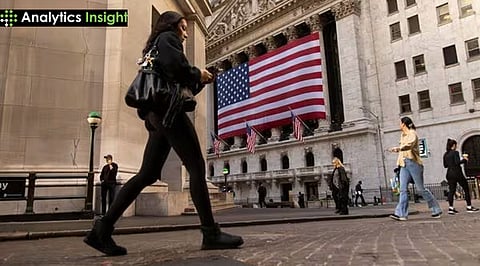US Stock Market Today: S&P 500 Falls 0.3% & NASDAQ Declines 0.7% as Small Business Optimism Hits Six-Month Low
US stock markets saw a slight reversal on Tuesday, with the rally in equities losing momentum after a strong start to the week. As of 11 a.m. Eastern Time in New York, the S&P 500 declined by 0.3%, the NASDAQ 100 was down 0.7%, while the Dow Jones Industrial Average rose 0.3%.
The broader MSCI World Index remained unchanged, with European markets showing some resilience. The Stoxx Europe 600 index rose by 1.1%, but US tech stocks, particularly large-cap AI-related companies, faced significant sell-offs.
SoftBank’s decision to exit its investment in NVIDIA has rattled some investors. The Japanese technology group sold its entire stake for approximately $5.83 billion. The transaction came as scepticism grew about the durability of the surge in artificial‑intelligence stocks. NVIDIA’s shares slipped slightly in pre‑market trading after the sale.
The move has prompted a broader discussion about whether AI‑related valuations can keep rising. Traders note that many high‑profile technology names have climbed sharply this year. SoftBank’s sale suggests some investors might prefer to lock in gains and reallocate capital to other AI initiatives.
Meanwhile, other AI‑oriented companies are also facing scrutiny. CoreWeave, a cloud‑infrastructure provider, reported strong quarterly revenue but lowered its full‑year forecast because a data‑centre contractor fell behind schedule. The company now expects 2025 revenue between $5.05 billion and $5.15 billion, short of analysts’ projections. Its shares fell in pre‑market trading after the announcement.
The adjustment at CoreWeave illustrates how quickly sentiment can shift in the AI space. Even companies that beat earnings estimates can see their stock prices drop if future guidance disappoints. This cautious mood has led some market participants to increase short positions in technology indexes, betting that valuations may cool.
US Labor Market Weakness Adds to Market Caution
Economic data are adding to the caution. An ADP report revealed that private employers cut an average of 11,250 jobs per week in the four weeks ending 25 October. The data suggest hiring weakened late in the month, hinting at a softer labour market. Nela Richardson, ADP’s chief economist, described October’s hiring bounce as “tepid” instead of broad-based.
Small business confidence has also slipped. The National Federation of Independent Business optimism index fell to 98.2 in October, its lowest reading in six months. Owners reported weaker earnings and less optimism about economic conditions. The decline in sentiment underscores concerns that higher costs and softer demand could weigh on activity.
These developments show that markets are balancing enthusiasm for AI‑driven growth with signs of economic headwinds.
Key Corporate Developments and Strategic Moves in the Market
Nebius Group NV saw third-quarter sales soar by 300%, driven by a new AI infrastructure deal with Meta Platforms Inc. and a growth forecast through 2026.
Paramount Skydance Corp. raised its target for job cuts and cost-saving measures after reporting financial results for the first time since a new investor group took over in August.
First Brands Group founder, Patrick James, directed finance department members to transfer corporate cash into his personal accounts, as revealed during testimony in federal court.
Parker-Hannifin Corp. agreed to acquire Filtration Group for $9.25 billion, expanding its industrial filtration business.
Microsoft Corp. plans to invest $10 billion in an AI data center along the Portuguese coast, marking a major European investment for the year.
LVMH plans to open major stores in China in December and is considering further expansion as signs of a sales rebound emerge in the country's luxury market.
Overall, Tuesday’s market action reflects a mix of profit-taking and growing caution around overvalued tech stocks. Investors are closely watching labor data and corporate earnings for clearer direction. The coming weeks may test whether optimism about AI and growth can withstand mounting economic pressures.
.png)

